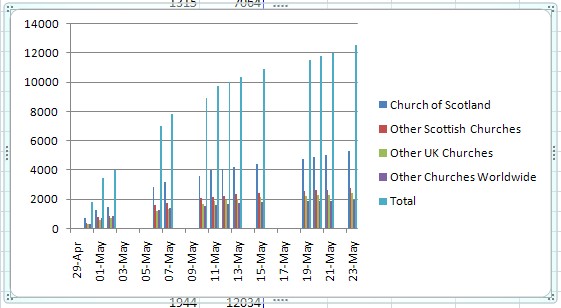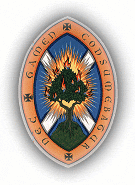 Related Articles
Related Articles
|
|
|
 Websites
Websites
|
|
|
|
|
Fellowship of Confessing Churches
National and international support is flooding in for a new grouping of evangelicals taking a stand for a biblical faith within the Church of Scotland.

Growth in Signatories from 29 April (launch) to 23 May 2009
There was a total of 12555 signatories at the time the list closed – including 471 Church of Scotland ministers and 33 Kirk Sessions (Sessions only meet every month or two months or less frequently).
The number of signatories was still increasing – at the rate of around 250 signatures per day.

Cumulative
--------------------------------------

By Sector
-------------------------------------
Church in crisis; Christian faith in renewal?
 As its General Assembly in May approaches, three new developments now push the Church of Scotland into deep crisis regarding sexuality; but not just sexuality. A week ago the issue in focus was the proposal to appoint a divorced minister living in a gay life-style to a church in Aberdeen. As its General Assembly in May approaches, three new developments now push the Church of Scotland into deep crisis regarding sexuality; but not just sexuality. A week ago the issue in focus was the proposal to appoint a divorced minister living in a gay life-style to a church in Aberdeen.
But now moves are taking place which could lead to the national Church splitting but (and irrespective of this particular issue) to overall positive effect. And a ground swell of support is flooding in for a new grouping which is seeking to hold a biblical line – with a list of signatories literally growing by the minute for the just-launched Fellowship of Confessing Churches. The FOCC (not to be confused with the FCC denomination) have issued a 'Statement about the coming General Assembly of 2009' on their web site (launched last night) in which it affirms support for all who struggle with temptation, but challenges the Church's acceptance of civil partnerships and same-sex sexual activity:
'To now declare explicitly an active homosexual lifestyle as holy, something the Bible unambiguously calls sin, denies in the most public fashion the authority of the church’s only Lord and Master, Jesus Christ. Our church would thus position itself outwith the fellowship of orthodox, credal Christianity worldwide.'
The statement which speaks of these issues creating 'a crisis of communion' (church-speak for 'prospect of a split') goes on to state:
'The majority of congregations of the Church of Scotland have no wish so to depart from orthodox Christian faith and practice, nor to be in fellowship with those who would so abandon the true Church of Jesus Christ.'
It is perhaps significant that the reference to loyalties are with respect of 'faith' and 'the true Church of Jesus Christ' rather than the national institution which is the Church of Scotland.
So what's going on?
The background to all of this is an objection raised by members of Aberdeen Presbytery to the ‘call’ of Rev. Scott Rennie to the pastorate at Queen’s Cross Church in the city, and a Council of Assembly initially considered what action should be taken. With a single-vote margin the Council referred the matter to the Assembly itself.
This situation would inevitably have resurrected (although it was never in any way dead, the Kirk has tried its best to bury it) the issue of sexuality, civil partnerships and the Church’s views and practices relating to these matters.
But the principle focus would have been on the Aberdeen situation and would not necessarily have invoked a wider debate – although it is difficult to see how the latter could be avoided.
However, three events have upped the ante considerably. And these are combining to create a tsunami for the Kirk.
A highly-provocative and partisan editorial

The current edition of the Church’s magazine, Life and Work, is carrying an editorial which scoffs at those who hold to a biblical morality and, in so doing, has overtly ‘taken sides’ at a critical moment. Although the Kirk stresses that the publication is ‘editorial independent’ it was obviously a mistake to believe it was also editorially neutral. (The editor Muriel Armstrong is due to retire shortly.) The article provoked a furious response.
A response from the Highlands
Perhaps in response to the Life and Work article a presbytery in the north-west of Scotland has now lodged a ‘overture’ (motion) with the General Assembly which will oblige the May gathering of ministers and elders to consider the wider issue of human sexuality.
The overture drawn up and submitted by Lochcarron and Skye Prebytery states that the ‘Church’s historic understanding of the Biblical teaching on homosexual practice has been questioned in recent years’ , and calls the Assembly to affirm that:
‘No court or agency of the Church may accept for training, ordain, admit, re-admit, induct or introduce to any ministry of the Church anyone involved in a sexual relationship outside of faithful marriage between a man and a woman.’
Woe, woe and thrice woe; the makings of a 'perfect storm'
And if this is not enough, to add to the Kirk’s significant woes the new FOCC grouping turns up the heat significantly. Whilst at the time (morning) of embarking on this article only 26 individuals had signed up to this developent , the web-site links suggest that this embryonic body sees itself – spiritually and relationally – playing within a worldwide and pan-denominational arena. This in itself is indicative of the fact that the particular issue of sexuality is causing disruption in many countries and in most denominations. Not just because of the issue itself (and extremely important it is) but because it has become a de facto litmus test of biblical orthodoxy and fidelity.
The combined effect of all of this could find the General Assembly right in the middle of a 'perfect storm' with global ramifications.
The ‘banner’ at the top of the Fellowship’s web page includes some high symbolism and the new organisation has given itself the title ‘Fellowship of Confessing Churches’. This speaks of informal but meaningful connections between local churches and believers based on adherence to the Word of God. The choice of words indicates that this is no mechanistic anything-goes piece of ecclesiastical joinery.
  One of the images is that of the ‘burning bush’ – and this symbol has been used since the late 17th century. It is now recognised around the world as an emblem of Presbyterianism. One of the images is that of the ‘burning bush’ – and this symbol has been used since the late 17th century. It is now recognised around the world as an emblem of Presbyterianism.
Meanwhile, the picture of a standard being raised is a direct take-off from that most famous photograph of American soldiers raising the Stars and Stripes on Japanese soil after the battle of Iwo Jima in 1945. However the flag is that of the Saint Andrew’s Cross – the Saltire. The picture invokes the memory of John Knox’s prayer: ‘Give me Scotland or I die’.
Meaningful unity between gospel congregations..
The potent strap-line proclaims a: ‘meaningful unity between gospel congregations’
Unity is a very emotive and highly important word, but it has become a ‘false god’ in justifying some spurious connections within the religious world. So ‘meaningful’ suggests not just a largely symbolic and passive organisational ecumenism but rather a dynamic and symbiotic alliance: a unity of spirit.
It is perhaps significant that the initiative would seem to have come spontaneously from the grass roots rather than from any particular and pre-existent grouping, but the burgeoning list of signatories rushing to subscribe includes men and women, ministers, elders, church members, academics and preachers . Also highly significantly is the fact that those from other denominations have very quickly ‘signed up’ to this new movement. The list includes believers from Kilsyth to Kenya and groupings and churches ranging from traditional denominations to new free evangelical churches; and from the USA to France to Australia.
Where's it all heading?
 How it will go from here is anyone’s guess (thank God He knows) but what we could be seeing is the first major wave of a Second Reformation – not just for the Kirk but for and within the evangelical church in Scotland. How it will go from here is anyone’s guess (thank God He knows) but what we could be seeing is the first major wave of a Second Reformation – not just for the Kirk but for and within the evangelical church in Scotland.
Let’s pray that it could also become the initial breakers of a move of the Spirit of God onto the beaches of a Godless Scotland and within the believing body of Jesus Christ - including those within the national church.
Rev. Thomas Chalmers, a Church of Scotland minister who led the 'Disruption' in 1843 which formed the Free Church of Scotland famously remarked: 'Who cares for [his own denomination] compared with the Christian good of Scotland?'
-------------
If you wish to stand alongside the position adopted by the FOCC you can add your name to the list.
Also you can e-mail this article to a friend by clicking on
the  link on the top-left of this page. link on the top-left of this page.
Footnotes:
Between starting and finishing this article, the list of signatories has grown from 26 to 174 on 29 April at 1.00pm. Judge for yourself the level of interest by visiting the new web site.
Many over the years have been of the opinion that if revival is to come to Scotland, then it will come via the national church.
|
Christians Together, 29/04/2009
|
|
|
|